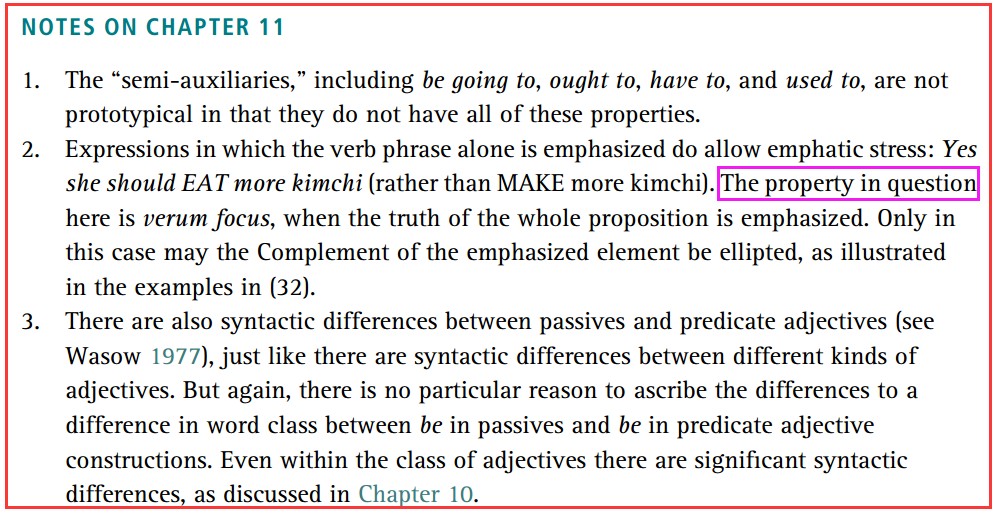The property in question 表示“讨论中/提到的属性”
备注:property为名词“属性/特性/性质”in question为介词短语作定语修饰名词property.
in question 讨论或议论中的;有疑问;不确定;提到的
On the day in question we were in Cardiff.在所说的那一天,我们在加的夫。
The future of public transport is not in question.公共交通的未来发展是不容置疑的。
The woman in question is sitting over there.提到的那个女的就在那里坐著呢。
The job in question is available for three months only.所谈到的这一工作空缺为时仅三个月。
【1】 The “semi-auxiliaries,” including be going to, ought to, have to, and used to, are not prototypical in that they do not have all of these properties.
【2】Expressions in which the verb phrase alone is emphasized do allow emphatic stress: Yes she should EAT more kimchi (rather than MAKE more kimchi). The property in question here is verum focus, when the truth of the whole proposition is emphasized. Only in this case may the Complement of the emphasized element be ellipted, as illustrated in the examples in (32).
【3】There are also syntactic differences between passives and predicate adjectives (see Wasow 1977), just like there are syntactic differences between different kinds of adjectives. But again, there is no particular reason to ascribe the differences to a difference in word class between be in passives and be in predicate adjective constructions. Even within the class of adjectives there are significant syntactic differences, as discussed in Chapter 10.
以上英文中文意思如下:仅供参考
【1】“半辅助词”,包括将要(be going to),应该(ought to),不得不(have to)和过去常常(used to),都不是典型的,原因在于它们没有所有这些特性。
【2】只强调动词短语的表达确实允许强调重读:是的,她应该吃更多的泡菜(而不是做更多的泡菜)。当整个观点的真实性被强调时,这里所讨论的性质是真正的焦点。只有在这种情况下,才能省略被强调补充成分,如(32)中的示例所示。
【3】在被动形容词和表语形容词之间也存在有句法差异(参见wasow 1977),就像不同种类的形容词之间存有句法差异一样。但是没有特别的理由将这种差异归因于被动形容词和谓词形容词类之间的单词差异。即使在形容词类别中,也存有显著的句法差异,如第10章所讨论的。







